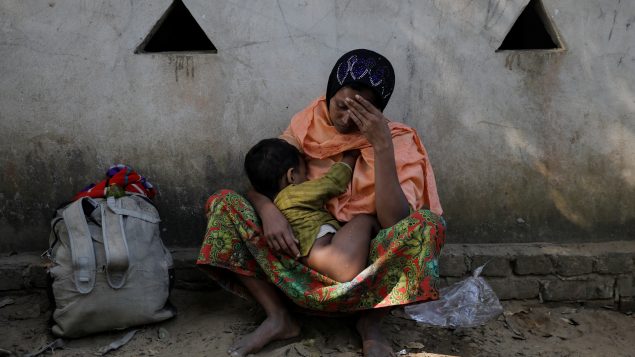Conditions on the ground in Myanmar are not conducive yet for the voluntary return of hundreds of thousands of Rohingya refugees who have sought refuge in neighbouring Bangladesh following a brutal security crackdown against the Muslim minority group, says Canada’s Special Envoy to Myanmar Bob Rae.
In a statement released on Thursday, Rae said he came to the conclusion following his recent trips to Bangladesh and Myanmar, where he visited the town of Sittwe in central Rakhine State, and joined a number of diplomats and UN officials on a daylong helicopter tour of the northern parts of Rakhine, where most of Rohingyas used to live.
“Everything I saw last week has reinforced the deep challenges facing the Rohingya population in Myanmar, the need for accountability for potential crimes against humanity, and the urgency of greater co-operation and action,” Rae said.
Prime Minister Justin Trudeau appointed the veteran Liberal politician and former Ontario premier last October to give him advice on the humanitarian crisis, which the United Nations has described as “a textbook example of ethnic cleansing.”
‘Full extent of destruction’

Aerial view of a burned Rohingya village near Maungdaw, north of Rakhine State, Myanmar, September 27, 2017. (Soe Zeya Tun/REUTERS/File Photo)
“My aerial tour of northern Rakhine State revealed the full extent of the destruction of the Rohingya communities,” Rae said. “This tour took place at the same time as there were further revelations about the execution of many Rohingya men.”
The rule of law requires that investigations be carried out by agencies beyond the control of the military, he said.
However, this basic standard is still not being met, Rae said, and human rights groups have accused the Burmese government of a comprehensive media crackdown, including the recent incarceration of two Reuters journalists for exposing these executions of Rohingya men.
Rae’s latest comments follow his interim report on the crisis that has seen more than 650,000 of Rohingyas flee the predominantly Buddhist Myanmar, also known as Burma, to neighbouring Bangladesh following a crackdown by Burmese security forces and Buddhist vigilante groups.
No safe place to return

Ansar Ullah, a Rohingya refugee who fled with his family from Myanmar a day before, carries his two daughters in baskets after thousands of newly arrived refugees spent a night by the road between refugee camps near Cox’s Bazar, Bangladesh October 10, 2017. Ansar Ullah, who said his village in Buthidaung region was attacked by Myanmar military, carried his two daughters in baskets for eight days as his family and other refugees made their way to Bangladesh. (Damir Sagolj/REUTERS)
In November, the governments of Myanmar and Bangladesh signed a highly controversial agreement on the eventual voluntary repatriation of Rohingya refugees, which many humanitarian agencies and human rights groups qualified as “dangerous” and “premature.”
“While the building of reception centres and transition centres is laudable, these alone will not lead to a voluntary return to northern Rakhine,” Rae said Thursday.
“It will take a much more sustained approach on the part of the government of Myanmar, and a demonstrated willingness to take on extremist elements that are clearly opposed to the return of the Rohingya and their integration with full citizenship and human rights in Myanmar.”
No place to call home

Amina Khatun, a 30 year old Rohingya refugee who fled with her family from Myanmar a day before, cries after she and other thousands of newly arrived refugees spent a night by the road between refugee camps near Cox’s Bazar, Bangladesh October 10, 2017. Amina said her village in Buthidaung region was attacked by Myanmar military and burnt down, and that she didn’t eat anything for the past three days. (Damir Sagolj/REUTERS)
Despite having lived in Myanmar for generations, the Rohingya Muslim minority is perceived by many in the Buddhist majority as an illegal fifth column, squatters from Bangladesh who should have no residency or citizenship rights in Burma.
Even the term Rohingya, which means of the Rakhine state, is extremely controversial in Myanmar, where many Buddhist use the term Bengali to refer to the persecuted Muslim minority.
The unwillingness of the government of Myanmar, headed by Nobel laureate and honorary Canadian Aung San Suu Kyi, to allow full international access to Rakhine is also a severe challenge to any sense of confidence about security, Rae said.
Monsoon season coming

A Rohingya refugee woman breast-feeds her child after they crossed Myanmar-Bangladesh border at the village of Maughpara near Cox’s Bazar, Bangladesh December 25, 2017. (Marko Djurica/REUTERS)
Rae also warned of the challenges posed by the upcoming monsoon season, which is expected to hit the region within the next two months. As many as 100,000 people living in the camps in Cox’s Bazar in Bangladesh could be directly impacted by the heavy rain, Rae said.
“The international community must do whatever it can to ensure a strong, common approach to all aspects: camp conditions in Bangladesh; the difficult situation in Myanmar itself; and the need to deal with those responsible for crimes against humanity,” Rae said. “More lives will be lost if we fail this challenge.”







For reasons beyond our control, and for an undetermined period of time, our comment section is now closed. However, our social networks remain open to your contributions.